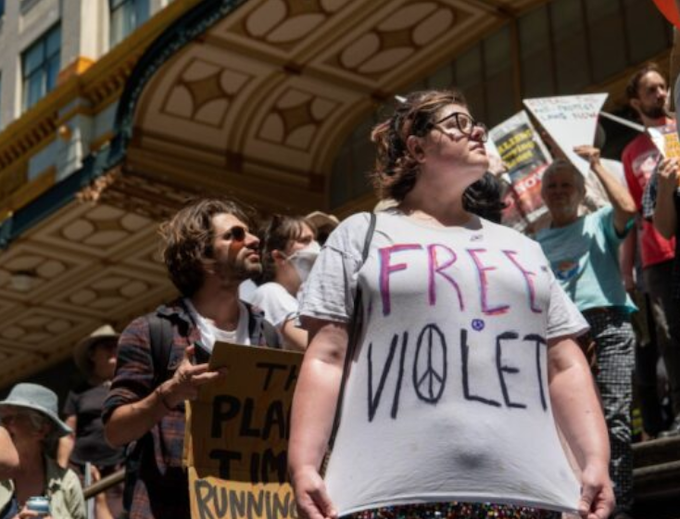
SPECIAL REPORT: By Wendy Bacon in Sydney
NSW Premier Dominic Perrottet is pleased that a Sydney magistrate jailed protester Deanna “Violet” Coco on Friday. But he is out of step with international and Australian human rights and climate change groups and activists, who have quickly mobilised to show solidarity.
On Monday, protests were held in Sydney, Canberra and Perth calling for the release of Coco who blocked one lane of the Sydney Harbour Bridge for half an hour during a morning peak hour in April.
She climbed onto the roof of a truck holding a flare to draw attention to the global climate emergency and Australia’s lack of preparedness for bushfires. Three other members of the group Fireproof Australia, who have not been jailed, held a banner and glued themselves to the road.
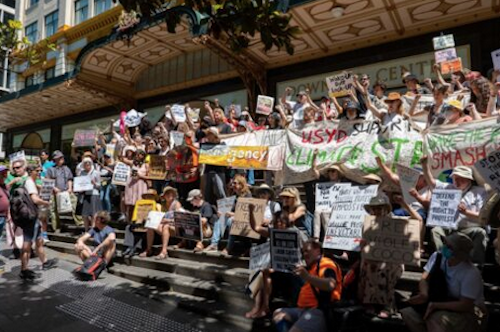
Coco pleaded guilty to seven charges, including disrupting vehicles, possessing a flare distress signal in a public place and failing to comply with police direction.
Magistrate Allison Hawkins sentenced Coco to 15 months in prison, with a non-parole period of eight months and fined her $2500. Her lawyer Mark Davis has lodged an appeal which will be heard on March 2, 2023.
Unusually for a non-violent offender, Hawkins refused bail pending an appeal against the sentence. Davis, who will again apply for bail in the District Court next week, said refusal of bail pending appeal was “outrageous”.
Climate change protester sentenced to jail over Sydney Harbour Bridge protest. Video: News 24
‘People shouldn’t be jailed for peaceful protest’
In Sydney, about 100 protesters gathered outside NSW Parliament House and then marched to the Downing Centre. The crowd included members of climate action groups Extinction Rebellion, Knitting Nannas and Fireproof Australia but also others who, while they might not conduct a similar protest themselves, believe in the right of others to do so.
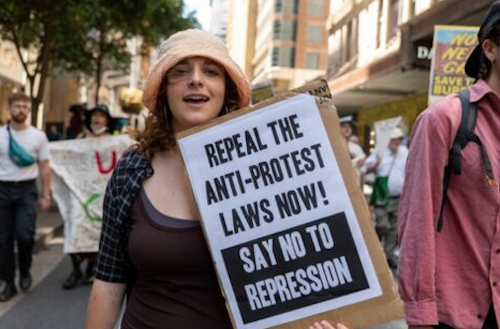
One of the protest organisers, Knitting Nanna Marie Flood, was unable to attend due to illness. Her message called for the release of Coco and an end to the criminalisation and intimidation of climate activists.
It was read by another Knitting Nanna, Eurydice Aroney:
“Nannas have been on Sydney streets protesting about gas and coal mines for about 8 years now. Over that time we’ve had lots of interactions with the Sydney Events police, and not a lot of trouble.
“You could say we are known to the police. We were amused and surprised at the recent climate emergency rally at town hall, when one of the police said to some Nannas that he thought we’d fallen in with the wrong crowd!
“Looks like we better clear some things up.”
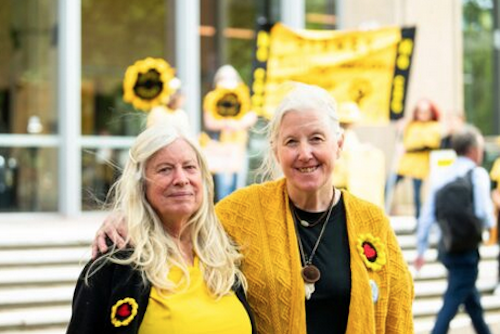
“We ARE the crowd who knows that climate action is urgent and it starts with stopping new gas and coal. We know the importance of public protests to bringing about social and political change.
“We will stand up against any move to take away the democratic right to protest. What is happening to Violet Coco is a direct result of the actions of the NSW government with the support of the ALP opposition.”
The message ended with a call to all climate activists: “Now is the time to BE THE CROWD — we can’t afford to fall for attempts to divide the climate movement. We all want to save the climate, and to do that we need to protect democracy.”
The Knitting Nannas have launched a challenge to the validity of the protest laws through the Environmental Defenders’ Office.
Snap rally at NSW Parliament and a march to the courts at the Downing Centre where climate activist Violet Coco was sentenced to 15 months in prison last week.
We demand repeal of the draconian anti-protest laws, an end to new fossil fuel projects and serious climate action now! pic.twitter.com/F1Yxs8L0DG
— Padraic Gibson (@paddygibson) December 5, 2022
One of those attending the protest was Josh Pallas, president of NSW Council for Civil Liberties. Civil Liberties has been defending the right to protest in NSW for more than half a century.
In a media release, he said: “Peaceful protest should never result in jail time. It’s outrageous that the state wastes its resources seeking jail time and housing peaceful protesters in custody at the expense of taxpayers.
“Protesters from Fireproof Australia and other groups have engaged in peaceful protest in support of stronger action on climate change, a proposition that is widely supported by many Australians across the political divide and now finding themselves ending up in prison.
“Peaceful protest sometimes involves inconvenience to the public. But inconvenience is not a sufficient reason to prohibit it. It’s immoral and unjust.”
Deputy Lord Mayor and Greens Councillor Sylvie Ellsmore told the crowd that they had the support of the City of Sydney which recently passed a unanimous motion calling for the repeal of the NSW government’s draconian anti-protest laws.
“If you are a group of businesses in the City of Sydney and you want to close the street for a street party, this state government will give you $50,000. If you are a non-violent protester who cares about climate change and you are blocking one lane of traffic for 25 minutes, they will give you two years [in jail].
“We know these laws are designed to intimidate you… Thank you for being the front line in the fight. you are the ones to put your bodies on the line to protest about issues we all care about, ” she said.
Amnesty International support for democracy
Amnesty International spokesperson Veronica Koman emphasised how important it was to see the defence of democratic rights from a regional perspective. She said that Amnesty was concerned that severe repression of pro-independence activists in West Papua was spreading across to other parts of Indonesia.
She fears the same pattern of increasing repression taking hold in NSW.
Human Rights Watch researcher Sophie McNeil, who has won many awards for her journalism, was another person who was quick to respond.
“Outrageous. Climate activist who blocked traffic on Sydney Harbour Bridge jailed for at least eight months” she tweeted on Friday.
Since then she has followed the issue closely, criticising the ABC for failing to quote a human rights source in its coverage of the court case and speaking at a protest in Perth on Monday.
Today she posted this tweet with a short campaigning #FreeVioletCoco video that has already attracted nearly 13,000 views:
Authorities in #Australia are disproportionately punishing climate activists in violation of their basic rights to peaceful protest
Violet Coco has been sentenced to 15 months in prison
Her crime? A peaceful protest that lasted 25 minutes#FreeVioletCoco @hrw pic.twitter.com/5qhyCWs2fk
— Sophie McNeill (@Sophiemcneill) December 5, 2022
‘If you’re reading this, you’ll know I am in prison’
In jailing Coco, Magistrate Hawkins went out of her way to diminish and delegitimise her protest. She described it as a “childish stunt’ that let an “entire city suffer” through her “selfish emotional action”.
Coco has been involved with climate change protests for more than four years and has been arrested in several other protests. On one occasion, she set light to an empty pram outside Parliament House.
Rather than fight on technicalities, she chosen to plead guilty, knowing that if the magistrate was hostile, she could be taken into custody at the end of Friday’s hearing.
Several steps ahead of her critics, she made a video and wrote a long piece to be published if she went to prison.
The piece begins: ”If you are reading this, then I have been sentenced to prison for peaceful environmental protest. I do not want to break the law. But when regular political procedure has proven incapable of enacting justice, it falls to ordinary people taking a stand to bring about change.”
She describes how her understanding of the facts of climate science and the inadequacy of the current response led her to decide to give up her studies and devote herself to actions that would draw attention to the climate emergency.
“Liberal political philosopher John Rawls asserted that a healthy democracy must have room for this kind of action. Especially in the face of such a threat as billions of lives lost and possibly the collapse of our liveable planet.
“But make no mistake — I do not want to be protesting. Protest work is not fun — it’s stressful, resource-intensive, scary and the police are violent. They refuse to feed me, refused to give me toilet paper and have threatened me with sexual violence.
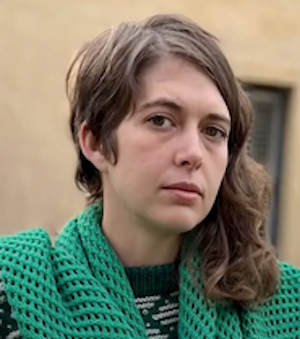
“I spent three days in the remand centre, which is a disgusting place full of sad people. I do not enjoy breaking the law. I wish that there was another way to address this issue with the gravitas that it deserves.”
She describes how she has already been forced to comply with onerous bail conditions:
“I was under 24 hour curfew conditions for 20 days in a small apartment with no garden. After 20 days effectively under house arrest, my curfew hours changed — at first I could leave the house for only 5 hours a day for the following 58 days, then 6 hours a day under house arrest for the following 68 days.
“This totalled 2017 hours imprisoned in my home for non-violent political engagement in the prevention of many deaths. Cumulatively, that is 84 days or 12 weeks of my freedom.”
Premier Perrottet says he does not object to protest so long as it does not interfere with “our way of life”.
If it does, individuals should have the “book thrown at them.”
His “way of life” is one in which commuters are never held up in traffic by a protest while endlessly sitting in traffic because of governments’ poor transport planning.
A way of life in which it is fine for governments to take years to house people whose lives are destroyed by fires and floods induced by climate change, to allow people to risk death from heat because they cannot afford air conditioners, open more coal and gas operations that will increase carbon emissions and turn a blind eye to millions of climate refugees in the Asia Pacific region.
It involves only protesting when you have permission and in tightly policed zones where passers-by ignore you.
Labor still backs anti-protest laws
Leader of the Opposition Chris Minns also says he has no regrets for supporting the laws which he says were necessary to stop multiple protests.
But laws don’t target multiple actions, they target individuals. He has not raised his voice to condemn police harassment of individual activists even before they protest and bail conditions that breach democratic rights to freedom of assembly.
There was no visible Labor presence at Sydney’s rally.
Perrottet and Minns may be making right wing shock jocks happy but they are out of line with international principles of human rights.
They also fail to acknowledge that many of Australia’s most famous protest movements around land rights, apartheid, Green Bans, womens’ rights, prison reform and environment often involved actions that would have led to arrest under current anti-protest laws.
They display an ignorance of traditions of civil disobedience. As UNSW Professor Luke Macnamara told SBS News: “[V]isibility and disruption have long been the hallmarks of effective protest.”
He believes disruption and protest need to go hand in hand in order to result in tangible change.
“There’s an inherent contradiction in governments telling protesters what are acceptable, passive, non-disruptive means of engaging in protests, when the evidence may well be that those methods have been attempted and have proven to be ineffective,” he said.
“It’s not realistic on the one hand to support the so-called ‘right to protest’, and on the other hand, expect the protest has no disruptive effects. The two go together.”
Wendy Bacon was previously a professor of journalism at the University of Technology Sydney and is an editorial board member of Pacific Journalism Review. She joined the protest. This article was first published by City Hub and is republished with the author’s permission.












































